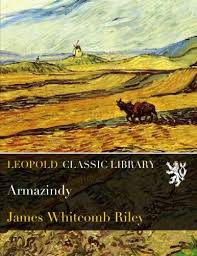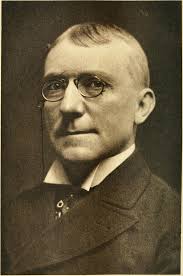Armazindy Page #15
James Whitcomb Riley poems book published in the 1894 book Armazindy and received very negative reviews that referred to poems like "The Little Dog-Woggy" and "Jargon-Jingle" as "drivel" and to Riley as a "worn out genius". Most of his growing number of critics suggested that he ignored the quality of the poems for the sake of making money.
Has deepened wide o’er all the azure plain; And, trailing through the leaves, the skirts of Night Are wet with dews as rain. But rest thou sweetly, smiling in thy dreams, With round fists tossed like roses o’er thy head, And thy tranc’d lips and eyelids kissed with gleams Of rapture perfected. THE CIRCUS PARADE The Circus!—The Circus!—The throb of the drums, And the blare of the horns, as the Band-wagon comes; The clash and the clang of the cymbals that beat, As the glittering pageant winds down the long street! In the Circus parade there is glory clean down From the first spangled horse to the mule of the Clown, With the gleam and the glint and the glamour and glare Of the days of enchantment all glimmering there! And there are the banners of silvery fold Caressing the winds with their fringes of gold, And their high-lifted standards, with spear-tips aglow, And the helmeted knights that go riding below. There’s the Chariot, wrought of some marvellous shell The Sea gave to Neptune, first washing it well With its fabulous waters of gold, till it gleams Like the galleon rare of an Argonaut’s dreams. And the Elephant, too, (with his undulant stride That rocks the high throne of a king in his pride,) That in jungles of India shook from his flanks The tigers that leapt from the Jujubee-banks. Here’s the long, ever-changing, mysterious line Of the Cages, with hints of their glories divine From the barred little windows, cut high in the rear, Where the close-hidden animals’ noses appear. Here’s the Pyramid-car, with its splendor and flash, And the Goddess on high, in a hot-scarlet sash And a pen-wiper skirt!—O the rarest of sights Is this “Queen of the Air” in cerulean tights! Then the far-away clash of the cymbals, and then The swoon of the tune ere it wakens again With the capering tones of the gallant cornet That go dancing away in a mad minuet. The Circus!—The Circus!—The throb of the drums, And the blare of the horns, as the Band-wagon comes; The clash and the clang of the cymbals that beat, As the glittering pageant winds down the long street. FOLKS AT LONESOMEVILLE Pore-folks lives at Lonesomeville— Lawzy! but they’re pore! Houses with no winders in, And hardly any door: Chimbly all tore down, and no Smoke in that at all— Ist a stovepipe through a hole In the kitchen-wall! Pump ’at’s got no handle on; And no woodshed—And, wooh!— Mighty cold there, choppin’ wood, Like pore-folks has to do!— Winter-time, and snow and sleet Ist fairly fit to kill!— Hope to goodness Santy Claus Goes to Lonesomeville! THE THREE JOLLY HUNTERS O there were three jolly hunters; And a-hunting they did go, With a spaniel-dog, and a pointer-dog, And a setter-dog also. Looky there! And they hunted and they hal-looed; And the first thing they did find Was a dingling-dangling hornet’s-nest A-swinging in the wind. Looky there! And the first one said—“What is it?” Said the next, “We’ll punch and see”: And the next one said, a mile from there, “I wish we’d let it be!” Looky there! And they hunted and they hal-looed; And the next thing they did raise Was a bobbin’ bunny cottontail That vanished from their gaze. Looky there! One said it was a hot base-ball, Zipped through the brambly thatch, But the others said ’twas a note by post, Or a telegraph-dispatch. Looky there! So they hunted and they hal-looed; And the next thing they did sight Was a great big bulldog chasing them, And a farmer, hollerin’ “Skite!” Looky there! And the first one said, “Hi-jinktum!” And the next, “Hi-jinktum-jee!” And the last one said, “Them very words Had just occurred to me!” Looky there! THE LITTLE DOG-WOGGY A Little Dog-Woggy Once walked round the World: So he shut up his house; and, forgetting His two puppy-children Locked in there, he curled Up his tail in pink bombazine netting, And set out To walk round The World. He walked to Chicago, And heard of the Fair— Walked on to New York, where he never,— In fact, he discovered That many folks there Thought less of Chicago than ever, As he musing- Ly walked round The World. He walked on to Boston, And round Bunker Hill, Bow-wowed, but no citizen heerd him— Till he ordered his baggage And called for his bill, And then, bless their souls! how they cheered him, As he gladly Walked on round The World. He walked and walked on For a year and a day— Dropped down at his own door and panted, Till a teamster came driving Along the highway And told him that house there was ha’nted By the two starve- Dest pups in The World. CHARMS I FOR CORNS AND THINGS Prune your corn in the gray of the morn With a blade that’s shaved the dead, And barefoot go and hide it so The rain will rust it red: Dip your foot in the dew and put A print of it on the floor, And stew the fat of a brindle cat, And say this o’er and o’er:— Corny! morny! blady! dead! Gory! sory! rusty! red! Footsy! putsy! floory! stew! Fatsy! catsy! Mew! Mew! Come grease my corn In the gray of the morn! Mew! Mew! Mew! II TO REMOVE FRECKLES—SCOTCH ONES Gae the mirkest night an’ stan’ ’Twixt twa graves, ane either han’; Wi’ the right han’ fumblin’ ken Wha the deid mon’s name’s ance be’n,— Wi’ the ither han’ sae read Wha’s neist neebor o’ the deid; An it be or wife or lass, Smoor tha twa han’s i’ the grass, Weshin’ either wi’ the ither, Then tha faice wi’ baith thegither; Syne ye’ll seeket at cockcraw— Ilka freeckle’s gang awa! A FEW OF THE BIRD-FAMILY The Old Bob-white, and Chipbird; The Flicker, and Chewink, And little hopty-skip bird Along the river-brink. The Blackbird, and Snowbird, The Chicken-hawk, and Crane; The glossy old black Crow-bird, And Buzzard down the lane. The Yellowbird, and Redbird, The Tomtit, and the Cat; The Thrush, and that Redhead-bird The rests all pickin’ at! The Jay-bird, and the Bluebird, The Sapsuck, and the Wren— The Cockadoodle-doo-bird, And our old Settin’-hen! THROUGH SLEEPY-LAND Where do you go when you go to sleep, Little Boy! Little Boy! where? ’Way—’way in where’s Little Bo-Peep, And Little Boy Blue, and the Cows and Sheep A-wandering ’way in there—in there— A-wandering ’way in there! And what do you see when lost in dreams, Little Boy, ’way in there?
Translation
Translate and read this book in other languages:
Select another language:
- - Select -
- 简体中文 (Chinese - Simplified)
- 繁體中文 (Chinese - Traditional)
- Español (Spanish)
- Esperanto (Esperanto)
- 日本語 (Japanese)
- Português (Portuguese)
- Deutsch (German)
- العربية (Arabic)
- Français (French)
- Русский (Russian)
- ಕನ್ನಡ (Kannada)
- 한국어 (Korean)
- עברית (Hebrew)
- Gaeilge (Irish)
- Українська (Ukrainian)
- اردو (Urdu)
- Magyar (Hungarian)
- मानक हिन्दी (Hindi)
- Indonesia (Indonesian)
- Italiano (Italian)
- தமிழ் (Tamil)
- Türkçe (Turkish)
- తెలుగు (Telugu)
- ภาษาไทย (Thai)
- Tiếng Việt (Vietnamese)
- Čeština (Czech)
- Polski (Polish)
- Bahasa Indonesia (Indonesian)
- Românește (Romanian)
- Nederlands (Dutch)
- Ελληνικά (Greek)
- Latinum (Latin)
- Svenska (Swedish)
- Dansk (Danish)
- Suomi (Finnish)
- فارسی (Persian)
- ייִדיש (Yiddish)
- հայերեն (Armenian)
- Norsk (Norwegian)
- English (English)
Citation
Use the citation below to add this book to your bibliography:
Style:MLAChicagoAPA
"Armazindy Books." Literature.com. STANDS4 LLC, 2025. Web. 11 Jan. 2025. <https://www.literature.com/book/armazindy_946>.




Discuss this Armazindy book with the community:
Report Comment
We're doing our best to make sure our content is useful, accurate and safe.
If by any chance you spot an inappropriate comment while navigating through our website please use this form to let us know, and we'll take care of it shortly.
Attachment
You need to be logged in to favorite.
Log In